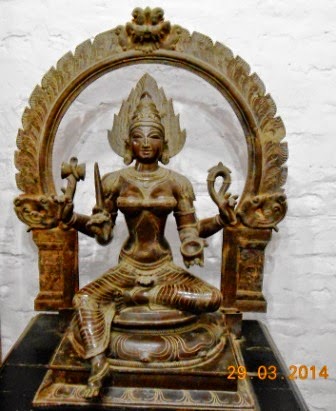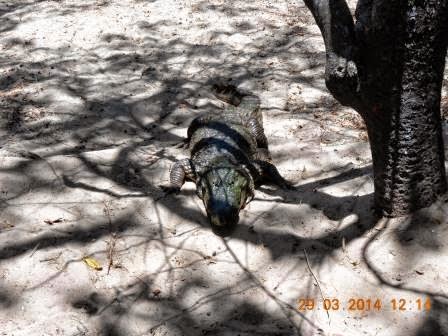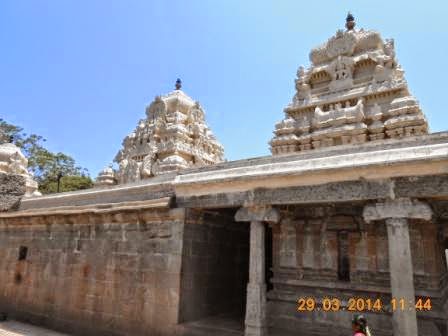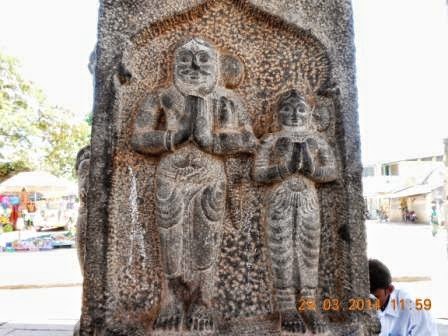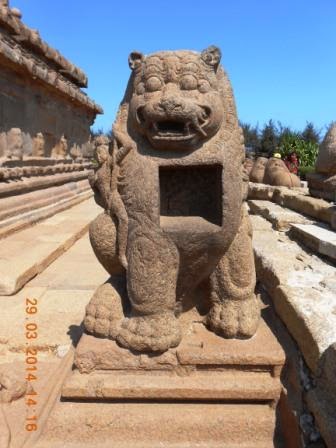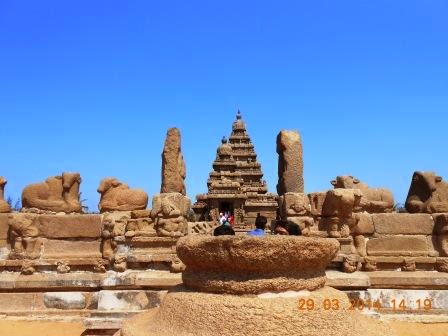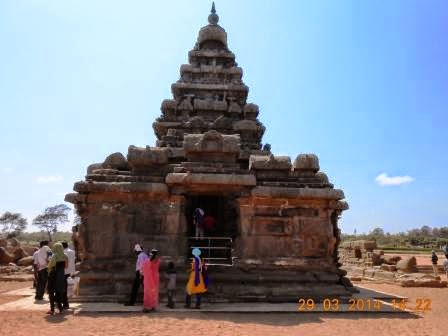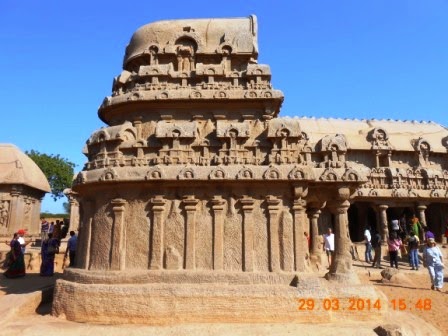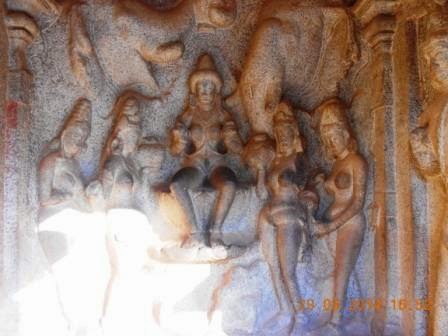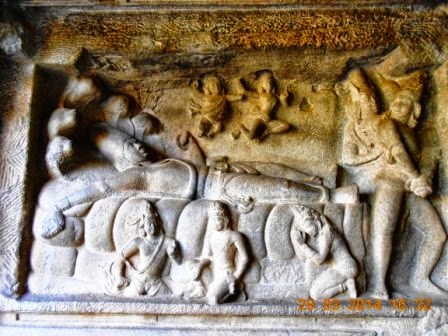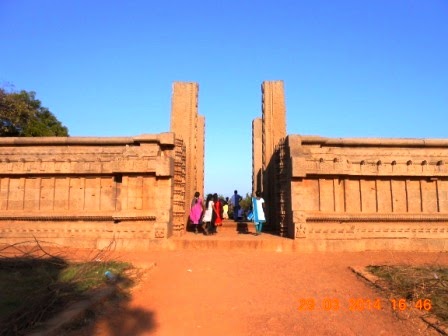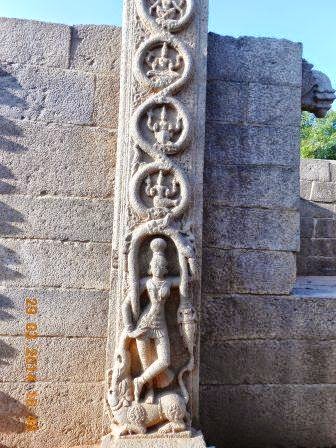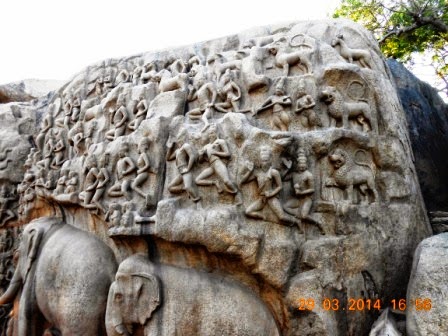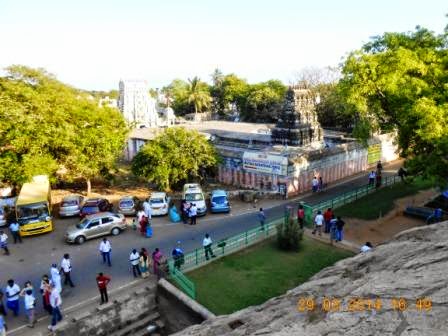31st March 2015.
On
29th March 2015, accompanied by the health workers of ACM Medical
Foundation, a tour was organized for Mahabalipuram. In this tour, we covered the Dakshinachitra, Crocodile Park, Thiruvidanthai, Mahabalipuram (Shore Temple, 5 Raths and Hill caves, Arjuna’s Penance, and Sthalasayana Perumal
Temple), which are on the way from Chennai to Mamallapuram. It has become a
Heritage Tour since the places covered are world heritage sites and historically
important monuments. Almost all the places come under the Archaeological
Survey of India (ASI). The crowd was
moderate, and foreigners also visited along with us. The Mamallapuram was once a seaport for the Pallava Kings, and their participation was large.
DAKSHINACHITRA HERITAGE MUSEUM
The
Dakshinachitra Heritage Museum was founded in 1996 and is run by the Madras Craft Foundation, an NGO. The museum has 18 authentic
historical houses from Tamil Nadu,
Kerala, Karnataka, and Andhra Pradesh, with rare & historical
materials, sculptures, antique musical instruments, and artistic materials exhibited. The houses were purchased,
dismantled, brought to place, and re-constructed without any deviation from
the original. In Tamil Nadu houses, it is like a small village comprising Nattukottai Chettiars’ houses, Weaver's houses, Potter's houses, and Brahmins’ houses. There is an Ayyanar Temple, too. In the weaver's house, a live
demo of weaving the sari is done. In the potter’s house, the making of pots is
demonstrated, and school children are encouraged to participate in a hands-on
experience.
In
addition to the above, there was a
cultural event and a puppet show. The
people who travel through ECR also peep into this museum. It attracts foreign
visitors too. In addition to the museum, the Dakshinachitra conducts a regular
program of sculpture-making in stone, glass, and Painting.
More
details about this Dakshinachitra Museum may be obtained from their website:
http://dakshinachitra.net/
Ayyanar Temple
Nattukottai Nagarathar house
Chariot
Paintings on the wall
Shiva and Parvati, a Bronze statue
Chamundi
Sri Valli Devasena Subramaniar
Terracotta Horses at Ayyanar Temple
Paintings on the cloth
Paintings on the cloth
The resting mandapa
A Typical Karnataka House
Sculpture on the wall in a Karnataka house
THE
MADRAS CROCODILE BANK AND TRUST
The
Madras Crocodile Bank and Trust was established by Mr Rom and Mr Zai Whitaker in the year 1976. This
is run by an NGO of the above trust. The specific goal of the
bank was to increase the populations of
three species of Indian Crocodile mugger crocodile (Crocodylus palustris), the saltwater Crocodile (Crocodylus porosus), and the rarest gharial (Gavialis
gangeticus). The Bank has more than 2500 crocodiles in 18 species. The bank conducts research programs.
Apart
from the Crocodile population, the Bank has the Turtles, Snakes ( Python and
anaconda. There is a demonstration hall for the extraction of venom from the snakes
and explaining the behaviors of snakes and crocodiles. It was learned that the crocodiles were fed beef once a week. The bank has a lot of trees and ponds to make the reptiles feel like they are in a natural environment. Birds like cranes and storks
build their nests in the tree tops. The Crocodile Bank allows visiting from 08.30 Hrs to 17.30 Hours on all days except Monday,
which is a holiday.
A Lone croc
A group of crocs
Birds nest in the tree top
SRI NIDHYA KALYANA PERUMAL TEMPLE AT THIRUVIDANTHAI
This
is the 62nd temple of the 108 Divya Desam Vishnu Temples. 22nd Divya
Desam in Thondai Nadu. Mangalasasanam was done by Thirumangai Alwar, one
of the 12 Alwars.
Moolavar : Sri Adi Varaha Perumal – in the form of a wild boar.
Thayar : Sri Komalavalli Nachiyar
Some
of the important features of this temple are...
The
Anjaneyar Temple after the Temple tank. There
is a 16-pillar mandapam in front of the temple, and there is a temple tank on the roadside. After 16 pillar mandapam, the
entrance arch or Mottai Gopuram. Dwajasthambam, Balipeedam, Garuda thoon/Vilakku thoon, and 4 pillar mandapams on the left are after the entrance. There is a mandapam on the right. Moolavar in the form of Varaham sitting on Adisheshan
and holding his concert on the right thigh.
In
the inner praharam temple, Thayar shops are in an Andal Shrine mandapam
on the right side.
The
sanctum sanctorum has sanctum, antarala, aratha mandapam and a maha mandapam. In
the maha mandapam Urchavar. Periya Thiruvadi is opposite to the moolavar at
the entrance of the mandapam.
HISTORY AND INSCRIPTION:
Since Thirumangai Alwar had done the mangalasasanam and is believed to have lived in the 8th Century, the temple might have been built in the 8th to 9th Century during the Pallava period with later Chozhas and Vijayanagaras contributions. The Chozha King Rajaraja-I (985 - 1014 CE), 8th Year rule inscriptions start with his Meikeerthi "திருமகள் போல... ".
Since Thirumangai Alwar had done the mangalasasanam and is believed to have lived in the 8th Century, the temple might have been built in the 8th to 9th Century during the Pallava period with later Chozhas and Vijayanagaras contributions. The Chozha King Rajaraja-I (985 - 1014 CE), 8th Year rule inscriptions start with his Meikeerthi "திருமகள் போல... ".
TEMPLE
TIMINGS:
The
temple is kept open from 06.00 hours to 12.00 hours and 15.00 hours to 20.00 Hrs.
CONTACT
DETAILS :
The
telephone number is +91 44 2474 2235.
The
temple website: http://www.thiruvidanthai.com/index.html
HOW
TO REACH :
The
temple is 38 km from Chennai and 16 km from Mahabalipuram on the East Coast
Road.
The
Mahabalipuram buses stop at Thiruvidanthai.
LOCATION
OF THE TEMPLE: CLICK
HERE
16 Pillar mandapam
Relief on the pillar of the 16 Pillar mandapam
Entrance arch with mandapam
The main shrine viewed from the entrance arch
4 Pillar mandapam
Dwajasthambam, balipeedam, and Garuda thoon
Main shrine entrance - maha mandapam with Garudalwar sannadhi
Thayar sannidhi
Sthala Vruksham
After
reaching Mamallapuram, we parked our bus at the parking lot in front of the Shore
Temple. We had our lunch inside the park, and the temple is well
maintained by ASI, with a green park, shadow trees, and toilets.
MAMALLAPURAM SHORE
TEMPLE
The
Mahabalipuram is derived from Mamallapuram, the city of Mamalla, a title
of Narasimhavarman-I, who ruled between 630 and 670 CE. It was an old port city.
The shore temple is
part of the seven pagodas of Mamallapuram, Rock-Cut temples, and a UNESCO World Heritage site. This is the opposite of Krishna Mandapam. This temple was
built between 700 and 728 CE by
Narasimha Varma-I. After a Tsunami in the year 2004, a dike
wall was constructed to avoid direct spraying of seawater on the temple
structure. The Vimana is of an elongated type similar to Rajasimha period
architecture. The main shrine faces east with a broken Linga, and the Somaskanda
relief is on the back wall. On the back of Shiva’s sanctum is a small Vishnu in
Ananda Sayanam on Adiseshan.
A large sculpture of Durga’s lion with the goddess seated on
the right leg of the animal. On its chest is a square niche with a
representation of Durga. At the foot of the pedestal on which the lion is
seated is a headless couchant deer.
The Detail plate was installed to guide
The Shore Temple
Group of ACM Medical Foundation students
Somaskandar relief with damaged Dhara Lingam
Somaskandar
Ananda Sayana Perumal back of Shiva's sannadhi
The Monolithic lion
Durgai's relief in the niche of the lion
Another view
View from the west side with balipeedam and gopura pillars
another view of the temple
View of the temple from the east.
THE FIVE
MONOLITHS ( 5 RATHS )
This
raths hewn of solid rock to form five free-standing monolithic temples. These
temples are named after the five Pandavas of the Mahabharata. The roofs of each are
not similar but are unique in architecture.
The five Rathas
MONOLITH -I. Dharmaraja Ratha.
This
is the southernmost temple of the group and the highest. Utilizing the natural
rock slope from south to north to
chisel from higher to lower. This is a pyramidal structure with a square base. The reliefs available are
Harihara, Brahma, Skanda, King Narasimha varman, Ardhanarisvara, Vishnu, Nitya
Dakshinamurthy, Rishabam, and Dwarabalas.
Arthanareeswarar
MONOLITH
–II. Bhima Ratha.
The
roof is sloped like the hood –the wagon is elongated on a rectangular base and is
supported by 4 pillars. The other ornamentations are chaitya windows and
pavilions. The Bima ratha roof contains no paddy–grass figure covering.
MONOLITH – III, Arjuna Ratha.
It
is a replica of the Dharmaraja Ratha. There are carved panels between pilasters
on the four sides of its main body. In
the corner panels, there are standing
dwarapalakas. In the center panel, Shiva is leaning on Nandhi Indira on
Airavata, and Vishnu is leaning on Garuda. Behind the Ratha, a monolithic couchant Nadhi is in a semi-finished state.
A semi-finished Rishabam
Shiva with royal attendants
MONOLITH – IV, DRAUPADI RATHA.
It is the most elegant of
all five and is supported by pilasters on all four sides. In the east niche is a standing Durga on the severed
head of a buffalo demon. Two male worshipers were kneeling at her feet, and four
dwarf ganas were flying overhead. Monolith Lion is just the opposite.
Monolithic Lion
Durgai with the severed head of Mahisan
MONOLITH –V, NAKULA-SAHADEVA-RATHA.
The temple is named after
the two heroes, the younger brothers. This is not in the row but in front
of Arjuna Ratha. Close to this, a monolithic elephant is standing in
parallel. The roof or the vimana is an Ornamental feature like Dharmaraja, Arjuna, and other Rathas. The Vimana is of the Gaja Prishtha type (elephant-back)
Gajabrushta vimanam
Squatting lion-supported pillars in the front mandapam
THE
HILL AREA – CAVES – TEMPLES – MANDAPAMS – SCULPTURES
CAVE
- I. VARAHA CAVE
This
cave is very near the Mahishasuramardini cave. The sculptures in this cave are
Varaha raising the earth from the ocean,
Gajalakshmi, Eight-armed Vishnu, King with queens, Gangadhara, and Brahma.
CAVE –II, MAHISHAMARDINI CAVE
This
cave has a long hall with triple cells, four pillars, and two pilasters. The
pillars are polygonal bulbous cushions and are supported by squatting lions. The hall on the left panel consists of Vishnu in Yoga Nidra on adiseshan. On
the right panel is Mahishamardini with eight hands on the lion fighting Mahisha, the demon, and the battlefield. See the posture of the Mahisan and his warriors, retreating in the opposite direction of Durgai to save their lives.
Vishnu sayanam on Adiseshan
Mahisan vadham by Durgai
RAMANUJAR CAVE
Initially, the cave was created for Lord Shiva, ie, Somaskandar. Later, the relief was chipped off and made as Vishnu Temple. The
markings can be seen in the center
shrine wall. The other two cells are for Brahma and Vishnu. The Conch and Chakra are chiseled on the side walls. The epigraph of Atyantakama Pallava, who is
identified as Parameshvaravarman, is also
available in this cave. The
front mandapa Pillars witness the extensive damage done to this cave and
mandapam.
Front mandapam without a roof
Cave front view
Squatting Lion Pillar
niche
Mandapam from a distance
MONOLITH –VI, GANESA RATHA.
The
path beyond the monkey group leads to Ganesa Ratha, one of the finest monolithic
temples at Mahabalipuram. It resembles Bima Ratha. On the top of the roof, a human head is decorated with a trident-shaped headgear, side prongs suggesting the horns. The roof has nine vase-shaped
finials and is the precursor of the latter gopuram. Originally, there was a
Shiva lingam, and Ganesha is occupying it now. Regular poojas are conducted.
Roof with kalasams
RAYALA
GOPURAM.
On top of the boulder is an unfinished mottai gopuram, or
the temple gate tower of the Vijayanagara period. This has the Vijayanagara
Period decoration of the jambs.
ARJUNA’S
PENANCE
The
carvings are unique in nature and are a very excellent Indian art. Two large
boulders with a narrow fissure have been used for the carving of reliefs. The
reliefs have gods like Surya, Chandra, Sidhas, Gandharvas, and Apsaras rushing
towards the center point where the Sage stands on his left foot, deeply engaged in
penance. A Shiva’s relief carrying a trident in one hand and attended by
dwarf bootha ganas. Apart from this, there are hunters, disciples, and wild
animals like lions, tigers, elephants, and boars. The group of elephants
is a masterpiece of Indian art. The cleft is occupied by Nagas,
Nagis, with hands in adoration. There is a temple of Vishnu with sages in
meditation. The cats and monkeys are also meditating. It is tiny but a
realistic carving of a group of monkeys with their family father, mother, and
child, with their routine work of picking the lice from each other's heads.
The above
scene represents the story of the Mahabharata, in which Arjuna performed penance to please Lord Shiva and got the Pasupata weapon.
The monkey and the cat are doing penance
SRI STHALA
SAYANA PERUMAL TEMPLE
This is situated in front of Arjuna’s penance.
This temple is dedicated to Vishnu. The carving and workmanship are not
lavish and belong to the Vijayanagara Period, i.e., the Fifteenth to Sixteenth century.
It is one of the 108 Diva Desams of Lord Vishnu. The temple has mangalasasanam by
Boothathalwar, Thirumangai Alwar, Namalwar, Periyalwar, and Andal. The place
Mahabalipuram is mentioned as Thiru Kadal Mallai in the hymns.
Moolavar : Sri Sthala sayana Perumal.
Thayar : Sri Nilamangai Thayar
Some of the important features of this temple
are...
The temple faces east with 4 pillar mandapam
and an unfinished mottai–gopuram similar to Rayala Gopuram. The Rajagopuram is after the unfinished gopuram at
the entrance to the main shrine. Dwajasthambam, Balipeedam, and Garudalvar sannadhi
are at the front.
The temple has a main sanctum, an artha mandapam, and a maha mandapam. Moolavar is in a reclining / sayanam posture on a bare floor without a shankha /conch
and chakra in his hands.
Thayar is in a separate sannidhi. There is a
separate shrine for Narasimha, Ramar, and Anjaneyar.
It is believed that this is the birthplace of
Boothathazhlvar, who was found in the temple tank.
HISTORY AND INSCRIPTIONS
The temple was originally near the seashore.
Later, the temple was expanded by Vikrama Chozha King from 1118 to 1125 CE.
TEMPLE TIMINGS
The temple is open from 07.00 hrs to 15.00 hrs
to 20.00 hrs.
CONTACT DETAILS :
The landline number is +91 44 2744 3245
HOW TO REACH :
The temple is very near the Mahabalipuram bus
stand.
Frequent buses are available from Chennai.
LOCATION
OF THE TEMPLE: CLICK HERE
Sri Sthala Sayana Perumal temple view from Arjuna's penance
View from the North side of the compound wall
Semi-finished front Gopuram
East side Rajagopuram
East side Rajagopuram view from the temple inside
Moolavar vimanam - like Rajagopuram
--- OM SHIVAYA NAMA ---





